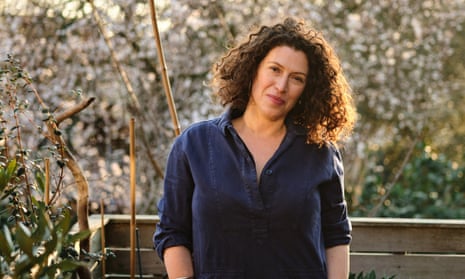Charlotte Mendelson’s four previous novels are clever, funny, ferociously observant and unapologetic about their origin in and passion for a particular corner of the bourgeoisie. Mostly set in London and north Oxford, looking towards Hungary in 2013’s brilliant Almost English, her fiction dissects the lives and minds of families who own messy Victorian houses, send children to Oxbridge and manage transgressive romantic lives. In the tradition of novels of middle-class dysfunction – Austen, Flaubert, Woolf and their descendants – the personal is political but politics simmer in the background: Mendelson’s version of England is a safe enough place for her characters to focus on domestic and professional life.
The Exhibitionist has been longlisted for the Women’s prize. It opens bravely with Ray Hanrahan, patriarch and painter, who lives in a large house in north London amid the chaos of “books everywhere, wizened tangerines and cold coffee”, declaring that “Tolstoy was an idiot.” “We’re famously happy, aren’t we? Aren’t we? And totally unique.” Ray believes himself unique as an artist and his wife and children unique in their devotion to him. Partly because fiction is almost by definition uninterested in the unique – we read to learn and see patterns – the novel turns on Ray being wrong. His family’s devotion makes him happy, or would if there were ever enough of it, and other people’s happiness doesn’t concern him because he doesn’t believe in other people. Meanwhile, Ray’s wife Lucia, also an artist, is lying on her studio floor, ignoring the phone because it will be her gallerist calling with good news for her, which will upset Ray: “He tends his grudge like a sacred lamp.” Lucia has spent decades sabotaging her own career in order to be “the perfect assistant, honoured to be elected to serve the genius”. Having learned all this in the opening pages, the reader spends the rest of the book wanting her to take that call. (She does. It’s big.)
The novel takes place over the weekend on which Ray has summoned his adult children, his brother and family, and an assortment of friends to celebrate the opening of his first exhibition in a decade. He wants to flaunt his career, his ownership and neglect of a big house, his wife’s loyalty and his children’s submission. It rapidly becomes clear that none of these things is as it seems to Ray, but nonetheless he dominates the novel and the thoughts and behaviour of all the characters. Lucia’s submission is willing but imperfect, ambition and desire never fully repressed. As well as her professional achievements she is concealing a new affair with a glamorous politician, Priya (party unspecified, not that kind of book, but there’s a whiff of Toryism). Lucia’s son from a previous relationship, Patrick, who is treated brutally by his stepfather, is patently unwell, living in a disintegrating caravan in the garden, allowing Ray to bully him into rejecting jobs he wants, unable to form relationships of any kind or even to speak much. Lucia and Ray’s oldest child, Leah, is her father’s handmaiden, compared by her more rebellious sister Jess to Dorothea Casaubon. As guests gather and Lucia hides in the garden texting her lover, Leah roams the house, spying and manipulating on her father’s behalf. Jess, who had escaped to Edinburgh, now returns with a partner who seems at least as much in love with Ray as with Jess, privately intent on persuading Jess to move back to her father’s house despite the obvious dangers.
Ray is monstrous, and we read partly in the hope that he will get his comeuppance. It’s risky to build a novel around a monster: some readers will be annoyed on behalf of the patriarchy; some lucky folk find wicked parents implausible; stark moralism is difficult in fiction. The Exhibitionist stands or falls on the plausibility of Ray’s family’s enslavement to his delusions of grandeur, and for some readers it will fall.
But partly because we see him through the eyes of his lifelong victims and partly because Mendelson is unfailingly excellent at the level of the sentence, Ray is horribly convincing, sitting spider-like at the centre of his web of destruction. The failure of Lucia’s repression makes her likable as well as pitiable and we long for her escape and Jess’s, Patrick and Leah seeming too far gone. This novel is a portrait of the artist as a monster, and for readers undeterred by the grand tradition of middle-class domestic realism, it’s a fine and haunting book.
